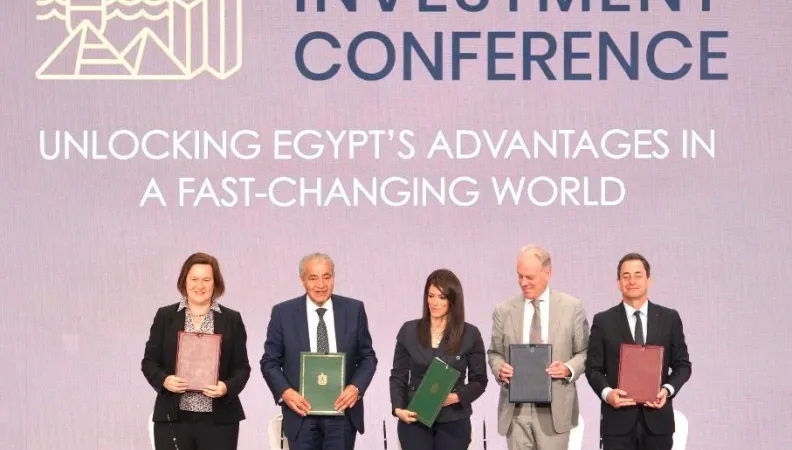Share the page
EU-Egypt Strategic Partnership: Egypt, AFD Group and EU join forces to strengthen Egypt’s food security

During the EU-Egypt Investment Conference, a grant agreement was signed for the construction of new wheat silos in Egypt. This Team Europe initiative, supported by a €60 million grant from the EU and implemented by AFD and the Ministry of Supply and Internal Trade (MOSIT), aims to expand wheat storage capacity and enhance food security.
A strategic project for Egypt
This project is crucial to strengthen food security in Egypt, the world’s largest importer of wheat. Accounting for about 12 million tons each year, these imports are essential for the country’s food supply especially for the vulnerable part of the population (wheat represents between 35 and 39% of the average caloric intake per person).
To respond to the disruptions caused by external shocks to Egypt’s wheat supply, the European Union has mobilized a "Food and Resilience Facility" of 100 million euros, part of which is dedicated to this silos project.
Implemented by the Egyptian Ministry of Supply and Internal Trade (MOSIT) and the Egyptian Holding Company for Silos & Storage, this project aims to increase wheat storage capacity by 420,000 tons, through silos construction in six governorates. This represents an increase of nearly 15% in the current national capacity. This project will also reduce grain losses, improve storage conditions and strengthen Egypt’s resilience to external and climatic shocks.
The French Delegation at the EU conference included high-level representation with H.E the French Ambassador in Egypt, Éric Chevallier, the Regional Director of AFD in North Africa, Mrs. Cécile Couprie, in addition to French entrepreneurs. Ambassador Chevallier highlighted: “This project is a concrete example of the collaboration between Team Europe and Egypt. By increasing wheat storage capacity, we are not only strengthening the country’s food security, but also supporting Egypt’s economic resilience. France remains committed to working with Egypt and the EU to improve value chains, climate-resilient agriculture and private sector involvement in sustainable initiatives.”
H.E Dr Rania A. Al Mashat, Minister of Egyptian International Cooperation (MOIC), H.E Dr. Aly Mosselhi, Minister of Supply and Internal Trade (MOSIT), H.E Director General for European Neighbourhood Policy and Enlargement Negotiations, European Union, Gert Jan Koopman, H.E the French Ambassador in Egypt, Éric Chevallier, and Cécile Couprie, AFD Regional Director, signed this major document. The preparatory phases of the project have already been initiated.
"Food security is not only important on a national level, but also globally. The Government of Egypt is committed to strengthening food security, as reflected in today's grant signing with the AFD for the construction of new wheat silos to support and improve grain storage in Egypt. It aims to increase resilience and enhance the efficiency and quality of domestic wheat supply value chain; putting people at the core of our partnerships." said H.E. Dr. Rania A. Al-Mashat, Minister of International Cooperation of the Arab Republic of Egypt (MOIC). On the Ministry of Supply and Internal Trade side, H.E Dr Aly Al-Moselhi has stressed the importance of such operation in serving Egypt’s Food security agenda, he mentioned on this occasion: "The new silos will bring 420,000 tons of additional storage capacity which will provide the Ministry of Supply with resilience to external shocks, in addition to reducing the wheat losses from traditional storage methods".
Olivér Várhelyi, European Commissioner for Neighbourhood and Enlargement, recalled on this occasion: "The EU-Egypt strategic and comprehensive partnership keeps delivering! A new agreement between Egypt and the Agence Française de Developpement (AFD), with EUR 60 million of EU support, will support Egypt to expand its grain storage by around 420,000 tonnes, an increase of 15% of its strategic capacity. The construction of new silos in six Egyptian governorates will contribute to ensuring food security and improve the country’s resilience to the volatility of food prices and the impact of climate change on the production of cereals.”
This joint commitment showcases the strong cooperation and deep relations between the European Union, its Member States and Egypt. It paves the way for future development and investment projects in line with the commitments made in recent months.
Learn more about the AFD Group’s activity in Egypt
Press contacts:
For AFD: Kabil Zerouali zeroualik@afd.fr/ Névine Greiss greissn@afd.fr
For the EU: Ana Pisonero, Ana.PISONERO-HERNANDEZ@ec.europa.eu
For the French Embassy in Egypt: Siham Soulaimani siham.soulaimani@diplomatie.gouv.fr
The Agence Française de Développement (AFD) Group has established itself as a key player in Franco-Egyptian cooperation, working since 2006 to support the country’s economic, social and environmental transitions.
In response to these challenges, AFD is stepping up its efforts and in 2022 revised its strategic intervention framework to support the country in the transitions underway and respond to Egypt’s specific climate change adaptation needs, gender equality or training and employment.
With a portfolio of €2.3 billion (November 2023), AFD is deploying a diversified range of instruments to support the Egyptian government in its development objectives, mainly in the sustainable infrastructure sectors (energy, transport, water and sanitation), climate finance, support for the private sector and entrepreneurship, and social sectors, including social protection.
Today, 55 projects are underway, contributing to the achievement of the Sustainable Development Goals (SDGs) and reflecting the priorities shared by Egypt and France. They are intended to support the integration of Egyptian financial, commercial and productive systems at the regional level; to support the development of green, inclusive and efficient infrastructure; and promote equitable and sustainable local territorial development.
